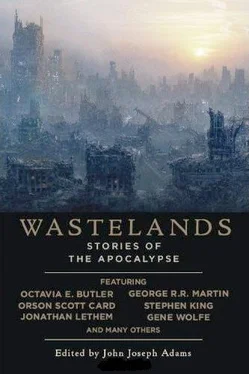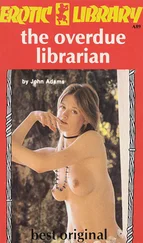“If he was talking on the phone, we’d hear him.”
“Not if the other person was talking.” Her brother had already seen enough of the kitchen. “Come on.”
She did not. There was an electric stove whose burners glowed crimson then fiery scarlet, a refrigerator containing a pound of cheese and two bottles of beer, and a pantry full of cans. There were dishes, pots, pans, knives, spoons, and forks in plenty.
Her brother returned. “The TV’s on in the front room, but there’s nobody there.”
“Dad has to be around somewhere,” Jill said. “I saw him.”
“I didn’t.”
“Well, I did.”
She followed her brother down a wide hall with high, dark windows on one side, past the big door to a big dining room where no one sat eating, and into a living room in which half a dozen drivers might have parked half a dozen buses, full of sunshine. “A man did this,” she said, looking around.
“Did what?”
“In here. A man picked out this furniture, the rugs, and everything.”
Her brother pointed. “Have a look over there. There’s a chair made out of horns. I think that’s hot.”
She nodded. “So do I. Only I wouldn’t have bought it. A room is—it’s a frame, and the people in it are the pictures.”
“You’re crazy.”
“No, I’m not.” She shook her head in self-defense.
“You’re saying Dad got this stuff to make him look good.”
“To make him look right. You can’t make people look good. If they don’t, they don’t. That’s all there is to it. But you can make them look right and that’s more important. Everybody looks right in the right place. If you had a picture of Dad—”
“I don’t.”
“If you did. And you were going to get a frame for it. The man in the frame store says take any of these you want. Would you take a pretty black one with silver flowers?”
“Heck no!”
“There you are. But I’d like a picture of me in a frame like that.”
Her brother smiled. “I’ll do it someday, Jelly. Did you notice the TV?”
She nodded. “I saw it as soon as we came in. Only you can’t hear what that man’s saying, because it’s on mute.”
“So he could talk on the phone, maybe.”
“In another room?” The telephone was on an end table near the television; she lifted the receiver and held it to her ear.
“What’s wrong? Could you hear him?”
“No.” Gently, she returned the receiver to its cradle. “There’s no noise at all. It’s not hooked up.”
“He’s not on a phone in another room, then.”
It was not logical, but she felt too drained to argue.
“I don’t think he’s here at all,” her brother said.
“The TV is on.” She sat down in a chair, bare waxed wood and brown-and-orange cushions. “Did you turn on these lights?”
Her brother shook his head.
“Besides, I saw him. He was standing in the door.”
“Okay.” Her brother was silent for a moment. He was tall and blond, like Dad, with a face that was already beginning to discover that it had been made for seriousness. “I’d have heard the car if he went away. I’ve been listening for something like that.”
“So have I.” She sensed, although she did not say, that there was a presence in this empty house that made you listen. Listen, listen. All the time.
MUTE, said the screen, and made no sound.
"I’d like to know what that man on the TV’s saying," she told her brother. "It’s on mute, and I can’t find the remote. I looked."
She said nothing, snuggling back against the brown-and-orange cushion and staring at the screen. The chair made her feel that she was enclosed by some defence, however small.
"Want me to change the channel?"
"You said you couldn’t find the changer."
"There’s buttons." He swung back a hinged panel at the side of the screen. "On and off. Channel up and channel down, volume up and volume down. Only no Mute button."
"We don’t need a Mute button," she whispered, "we need an Unmute button."
"Want to change the channel? Look."
The next channel was a gray screen with wavy lines and the yellow word mute in one corner, but the next one after it had a pretty, friendly looking woman sitting at a table and talking. The yellow MUTE was in the corner of her screen, too. She had a very sharp yellow pencil in her hands, and she played with it as she talked.
Jill wished that she would write something instead, but she did not.
The next channel showed an almost empty street, and the yellow MUTE. The street was not quite empty because two people, a man and a woman, were lying down in it. They did not move.
"You want to watch this?"
Jill shook her head. "Go back to the man Dad was watching."
"The first one?"
She nodded, and channels flicked past.
"You like—" Her brother froze in mid-sentence. Seconds crept past, fearful and somehow guilty.
"I—"Jill began.
"Shhh! Someone’s walking around upstairs. Hear it?" Her brother dashed out of the room.
She, who had heard nothing, murmured to herself, "I really don’t like him at all. But he talks slower than the woman, and I think maybe I can learn to read his lips if I watch him long enough."
She tried, and searched for the control between times.
There had been no one upstairs, but there was a big bedroom there with two small beds, one against the east wall and one against the south, three windows, and two dressers. Her brother had wanted a room of his own; but she, terrified at the thought of lying alone in the dark, promised that the room would be his room and she would have no room-that she would sweep and dust his room for him every day, and make his bed for him.
Reluctantly, he consented.
They ate canned chili the first night, and oatmeal the next morning. The house, they found, had three floors and fourteen rooms fifteen counting the pantry. The TV, which Jill had turned off when she had left the room to heat their supper, was on again, still on mute.
There was an attached garage, with two cars. Her brother spent all afternoon hunting for the keys to one or the other without finding them. Indeed, without finding any keys at all.
In the living room, the man who had been (silently) talking talked silently still, on and on. Jill spent most of her time watching him, and eventually concluded that he was on tape. His last remark (at which he looked down at the polished top of his desk) being followed by his first.
That evening, as she prepared Vienna sausages and canned potato salad, she heard her brother shout, "Dad!" The shout was followed by the banging of a door and the sound of her brother’s running feet.
She ran too, and caught up with him as he was looking through a narrow doorway in the back hall. "I saw him!" he said. "He was standing there looking right at me."
The narrow doorway opened upon darkness and equally narrow wooden steps.
"Then I heard this slam. I know it was this one. It had to be!"
Jill looked down, troubled by a draft from the doorway that was surely cold, dank, and foul. "It looks like the basement," she said.
"It is the basement. I’ve been down here a couple times, only I never could find the light. I kept thinking I’d find a flashlight and come down again." Her brother started down the steps, and turned in surprise when a single dim bulb suspended from a wire came on. "How’d you do that, Jelly?"
"The switch is here in the hall, on the wall behind the door."
"Well, come on! Aren’t you coming?"
She did. "I wish we were back at that place."
Her brother did not hear her. Or if he heard her, chose to ignore her. "He’s down here somewhere, Jelly-he’s got to be. With two of us, he can’t hide very long."
"Isn’t there any other way out?"
Читать дальше












